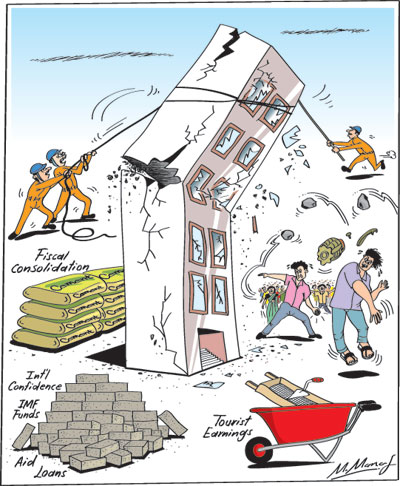Columns
Recovering from the crisis and rebuilding the economy
View(s):It is easy to destroy, difficult to rebuild. This incontrovertible truism is particularly applicable to the current economic situation. Whenever and however this crisis is resolved, restoring political and economic stability and international confidence is enormously a challenging task.
 Three prerequisites
Three prerequisites
Rejuvenating and rebuilding the economy after the economic consequences of the political crisis is a Herculean task. Three prerequisites for rebuilding the economy are the restoration of international confidence in the country’s political stability, clear cut, certain and sound macroeconomic policies and achieving a reasonable fiscal balance.
International confidence
Restoring international confidence and stabilising the economy cannot be achieved as fast as it is being destroyed. A precondition is strong indications that there will be political stability. This is a difficult task owing to the manner in which the political crisis was brought about and it is being prolonged by unruly behaviour. These factors make it difficult to inspire international confidence in the country’s commitment to democracy and constitutional governance. From now onwards, Sri Lanka will, no doubt, be considered a fragile democracy.
Why international confidence?
Restoring international confidence and trust is crucial for our economy as it affects our trade, aid and tourism, among others. International confidence will play an important role in enabling the flow of foreign assistance and loans that were agreed on before the political crisis. The Japanese and US aid disbursements that are being withheld would also be released. It will improve international ratings that will reduce international borrowing rates and would improve the investment climate.
 IMF loan
IMF loan
The IMF’s tranche of US$ 500 million of a loan of US$ 1.5 billion is vital to restore international confidence and provide balance of payments support. It will assist in improving the ratings of international agencies that would in turn improve the investment climate and reduce international borrowing rates. The release of the loan also requires compliance with agreed conditions that have been flouted.
Policy certainty
Once political stability is restored, economic policies must be focussed on stabilisation of the economy with sound macroeconomic policies. There must be certainty and predictability in economic policies.
The initial objective should be short term substantial and inclusive economic gains rather than visions and dreams of making the country a rich and prosperous one in the distant future. The need of the hour is a 2020 vision for economic stability and growth.
Macroeconomic stability
In the light of the political disruption, it is vital for the postponed budget for 2019 to have a clear one-year programme of economic recovery. It should focus on increasing near-term production and exports.
No doubt the budget that was prepared for presentation on November 5 would have to be modified. Combining the political compulsion of a populist budget with one that keeps to fiscal consolidation targets is an enormously challenging task. This is especially so as much damage has been done by the interim government by reducing taxes and increasing expenditure. Consequently the fiscal deficit target of 4 percent of GDP is unlikely to be achieved. A large fiscal deficit would destabilise the economy and retard economic growth.
IMF conditions
Apart from the adverse economic consequences of a larger fiscal deficit on the stability of the economy, the deviation from fiscal target would not be in conformity with the agreed conditions for the IMF facility of US$ 1.5 billion. The postponement or even cancellation of this IMF loan would not only have direct adverse impact on the external reserves and debt repayment capacity, but also affect the country’s credibility in international financial markets and among investors.
Therefore, drastic fiscal measures to cut expenditure are vital to achieve fiscal consolidation. The revenue enhanced fiscal consolidation programme must be adhered to as the economic consequences of high fiscal deficits are serious. Fiscal slippage must be avoided at all costs.
Balance of payments
The reversal to the balance of payments owing to the recent disruption has to be remedied. Political stability and restoration of parliamentary democracy will play an important role in enabling the flow of foreign assistance and loans that were agreed on before the political crisis. The IMF’s tranche of US$ 500 million of a loan of US$ 1.5 billion is vital to restore international confidence and enhance the balance of payments. Political stability and return to a constitutional propriety is vital.
Political reform
A political reformation is needed to restore such confidence as in 2015. However, the way in which law and order was undermined by the same actors as those who were credited with the change makes the polity a highly untrustworthy one. Therefore, a new wave of leadership is needed to restore international confidence.
A strong government committed to democracy and constitutional governance is imperative. This foremost task is no easy one as the country’s political divisiveness, party interests and political self-interests supersede the national interests.
In spite of the enormous difficulties of achieving good governance, it is imperative to achieve it, as we did in January 2015, as the country’s future depends on it. Admittedly, it is a more difficult task this time around. It is one of making the impossible, possible.
Way forward
Although resolving the economic consequences of this political crisis is a Herculean task, early action to achieve political stability, restore international confidence, achieving macroeconomic stability and pursuing a certain and predictable economic development programme are vital to save the country from an economic crisis.
Political stability is the foremost and prior condition. It is a precondition for international confidence. A foremost economic condition is to ensure that there is no fiscal slippage. Although this a politically difficult task, it is vital to achieve it for both the short term and long term economic interests.
Inability to achieve political stability, restore international confidence and pursue sound fiscal and macroeconomic policies could lead the country to economic stagnation and an economic abyss.


Leave a Reply
Post Comment